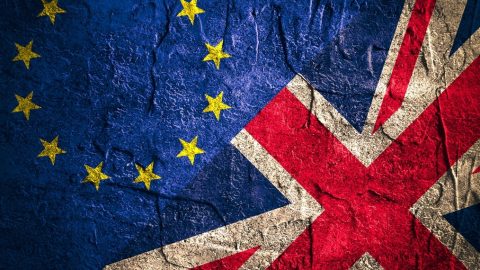Yesterday’s referendum in the UK surprised with a narrow majority in favour of Brexit. According to the latest results, 51.8% voted for the Brexit, i.e. the exit from the EU. Polls and betting odds had been suggesting a majority in favour of remaining (“Bremain”) in the EU.
As expected, Brexit is triggering a massive negative reaction in financial markets this morning, not the least since in the days leading up to the referendum the development of the British pound, of equity volatility, and of European and British equity indices had indicated that the majority of investors was anticipating a rejection of the Brexit.
Pound and euro down against the US dollar
The British pound and the euro are sliding significantly against the US dollar, the yen, and the Swiss franc. Even in the first hours when the victory of the Brexit camp was becoming more likely, the pound lost 10% and the euro 4% vis-à-vis the US dollar.
Massive corrections on the equity markets
A massive correction on the equity markets is under way, in conjunction with a drastic increase of volatility indicators. The Japanese market has shed 8% this morning, while for British and European equities, double-digit losses are likely.
Bonds and gold benefit from flight to safety
We expect the spreads of bonds from the European periphery to widen, whereas the yields of German and British government bonds and US Treasury bonds will be falling and heading towards, or below, zero in the foreseeable future. Gold should benefit from this situation, as it usually does in states of shock. In a first reaction gold futures already gained USD 80 per troy ounce.
Economic and political consequences are difficult to predict
The exit of the UK is a break in European post-war history – for the country itself, and also for the European Union. The economic and political consequences are difficult to predict due to the uncertainties about the future political constellation in the UK, about the question of what trade agreements between the UK and Europe will replace the EU treaties, and about the effects on the future of the European Union. Therefore we expect the markets to remain in risk-off mode in the medium term even after the immediate reaction today. Consequently, risky investments will remain under pressure. Economic policy measures, especially from the central banks will be able to alleviate some of the negative effects, but they will not be able to completely avoid negative fallout on the UK and the European economy and on markets.
Legal disclaimer
This document is an advertisement. Unless indicated otherwise, source: Erste Asset Management GmbH. The language of communication of the sales offices is German and the languages of communication of the Management Company also include English.
The prospectus for UCITS funds (including any amendments) is prepared and published in accordance with the provisions of the InvFG 2011 as amended. Information for Investors pursuant to § 21 AIFMG is prepared for the alternative investment funds (AIF) administered by Erste Asset Management GmbH pursuant to the provisions of the AIFMG in conjunction with the InvFG 2011.
The currently valid versions of the prospectus, the Information for Investors pursuant to § 21 AIFMG, and the key information document can be found on the website www.erste-am.com under “Mandatory publications” and can be obtained free of charge by interested investors at the offices of the Management Company and at the offices of the depositary bank. The exact date of the most recent publication of the prospectus, the languages in which the fund prospectus or the Information for Investors pursuant to Art 21 AIFMG and the key information document are available, and any other locations where the documents can be obtained are indicated on the website www.erste-am.com. A summary of the investor rights is available in German and English on the website www.erste-am.com/investor-rights and can also be obtained from the Management Company.
The Management Company can decide to suspend the provisions it has taken for the sale of unit certificates in other countries in accordance with the regulatory requirements.
Note: You are about to purchase a product that may be difficult to understand. We recommend that you read the indicated fund documents before making an investment decision. In addition to the locations listed above, you can obtain these documents free of charge at the offices of the referring Sparkassen bank and the offices of Erste Bank der oesterreichischen Sparkassen AG. You can also access these documents electronically at www.erste-am.com.
Our analyses and conclusions are general in nature and do not take into account the individual characteristics of our investors in terms of earnings, taxation, experience and knowledge, investment objective, financial position, capacity for loss, and risk tolerance. Past performance is not a reliable indicator of the future performance of a fund.
Please note: Investments in securities entail risks in addition to the opportunities presented here. The value of units and their earnings can rise and fall. Changes in exchange rates can also have a positive or negative effect on the value of an investment. For this reason, you may receive less than your originally invested amount when you redeem your units. Persons who are interested in purchasing units in investment funds are advised to read the current fund prospectus(es) and the Information for Investors pursuant to § 21 AIFMG, especially the risk notices they contain, before making an investment decision. If the fund currency is different than the investor’s home currency, changes in the relevant exchange rate can positively or negatively influence the value of the investment and the amount of the costs associated with the fund in the home currency.
We are not permitted to directly or indirectly offer, sell, transfer, or deliver this financial product to natural or legal persons whose place of residence or domicile is located in a country where this is legally prohibited. In this case, we may not provide any product information, either.
Please consult the corresponding information in the fund prospectus and the Information for Investors pursuant to § 21 AIFMG for restrictions on the sale of the fund to American or Russian citizens.
It is expressly noted that this communication does not provide any investment recommendations, but only expresses our current market assessment. Thus, this communication is not a substitute for investment advice.
This document does not represent a sales activity of the Management Company and therefore may not be construed as an offer for the purchase or sale of financial or investment instruments.
Erste Asset Management GmbH is affiliated with the Erste Bank and austrian Sparkassen banks.
Please also read the “Information about us and our securities services” published by your bank.


